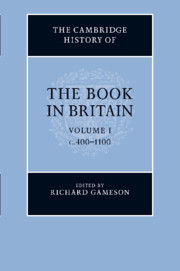Book contents
- Frontmatter
- 1 From Vindolanda to Domesday: the book in Britain from the Romans to the Normans
- PART I THE MAKING OF BOOKS
- PART II THE CIRCULATION OF BOOKS
- PART III TYPES OF BOOKS AND THEIR USES
- PART IV COLLECTIONS OF BOOKS
- 27 Patrick, apostle of the Irish
- 28 The library of Iona at the time of Adomnán
- 29 Literacy in Anglo-Saxon England
- 30 Aldhelm’s library
- 31 The library of the Venerable Bede
- 32 The library of Alcuin’s York
- 33 The library of Cynewulf
- 34 King Alfred and his circle
- 35 Ælfric’s library
- 36 The library of Byrhtferth
- 37 The library of Wulfstan of York
- 38 Rhygyfarch ap Sulien and Ieuan ap Sulien
- PART V CODA
- Bibliography
- Concordance of named manuscripts
- Index of manuscripts
- General Index
- Plate 4.1: The Lindisfarne Gospels"
- Plate 5.1: The Lichfield/St Chad Gospels"
30 - Aldhelm’s library
from PART IV - COLLECTIONS OF BOOKS
Published online by Cambridge University Press: 28 March 2012
- Frontmatter
- 1 From Vindolanda to Domesday: the book in Britain from the Romans to the Normans
- PART I THE MAKING OF BOOKS
- PART II THE CIRCULATION OF BOOKS
- PART III TYPES OF BOOKS AND THEIR USES
- PART IV COLLECTIONS OF BOOKS
- 27 Patrick, apostle of the Irish
- 28 The library of Iona at the time of Adomnán
- 29 Literacy in Anglo-Saxon England
- 30 Aldhelm’s library
- 31 The library of the Venerable Bede
- 32 The library of Alcuin’s York
- 33 The library of Cynewulf
- 34 King Alfred and his circle
- 35 Ælfric’s library
- 36 The library of Byrhtferth
- 37 The library of Wulfstan of York
- 38 Rhygyfarch ap Sulien and Ieuan ap Sulien
- PART V CODA
- Bibliography
- Concordance of named manuscripts
- Index of manuscripts
- General Index
- Plate 4.1: The Lindisfarne Gospels"
- Plate 5.1: The Lichfield/St Chad Gospels"
Summary
When, in the course of his magisterial but not always wholly trustworthy history of early England, Historia ecclesiastica gentis Anglorum, the Venerable Bede (who died in 735) depicted his elder contemporary Aldhelm, abbot Malmesbury, then bishop of Sherborne (who was born in 639/40 and died in 709/10) as ‘vir undecunque doctissimus’ (‘a man most learned in every way’), such a description, given Aldhelm’s extraordinary output and extensive influence, seems entirely appropriate even from so learned an authority. In deploying such a well-used phrase Bede would likely have realised that he was echoing the acclaim that Terentianus Maurus gave Varro, as reported by Augustine in the De civitate Dei; but he would also surely have spotted the fact that he himself had used the same words of King Aldfrith of Northumbria (686–705) only a few chapters previously. The association of Aldhelm with, on the one hand, a learned Roman widely celebrated in Continental sources and, on the other, a well-born Anglo-Saxon with exemplary Celtic connections, seems entirely appropriate; and in attempting to assess the extent of Aldhelm’s library it is important to remember not only his two-stage education at the hands of teachers from very different backgrounds, but also the extent to which Aldhelm himself decried and attempted to mask the one in exalting and promoting the other.
Keywords
- Type
- Chapter
- Information
- The Cambridge History of the Book in Britain , pp. 591 - 605Publisher: Cambridge University PressPrint publication year: 2011
- 2
- Cited by

